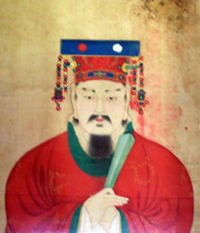|
Gyeongju Choe Clan
The Gyeongju Choe clan () is a Korean clan, with a bon-gwan located in Gyeongju, North Gyeongsang Province. According to a census from 2015, the population of the Gyeongju Choe clan is 945,005 in South Korea. The apical ancestor of the Gyeongju Choe clan is Choe Chiwon, a Confucian scholar and official during the Unified Silla period. See also * Choi (Korean surname) Choi is a Korean family surname. As of the South Korean census of 2015, there were around 2.3 million people by this name in South Korea or roughly 4.7% of the population. In English-speaking countries, it is most often anglicized ''Choi'', an ... References Choe clans Choe clan of Gyeongju {{Korea-stub ... [...More Info...] [...Related Items...] OR: [Wikipedia] [Google] [Baidu] |
Family
Family (from la, familia) is a Social group, group of people related either by consanguinity (by recognized birth) or Affinity (law), affinity (by marriage or other relationship). The purpose of the family is to maintain the well-being of its members and of society. Ideally, families offer predictability, structure, and safety as members mature and learn to participate in the community. Historically, most human societies use family as the primary locus of Attachment theory, attachment, nurturance, and socialization. Anthropologists classify most family organizations as Matrifocal family, matrifocal (a mother and her children), patrifocal (a father and his children), wikt:conjugal, conjugal (a wife, her husband, and children, also called the nuclear family), avuncular (a man, his sister, and her children), or Extended family, extended (in addition to parents and children, may include grandparents, aunts, uncles, or cousins). The field of genealogy aims to trace family lineages ... [...More Info...] [...Related Items...] OR: [Wikipedia] [Google] [Baidu] |
Royal House
A dynasty is a sequence of rulers from the same family,''Oxford English Dictionary'', "dynasty, ''n''." Oxford University Press (Oxford), 1897. usually in the context of a monarchy, monarchical system, but sometimes also appearing in republics. A dynasty may also be referred to as a "house", "family" or "clan", among others. Historians periodization, periodize the histories of many states and civilizations, such as Ancient Iran (3200 - 539 BC), Ancient Egypt (3100 – 30 BC) and History of China#Ancient China, Ancient and Imperial China (2070 BC – AD 1912), using a framework of successive dynasties. As such, the term "dynasty" may be used to delimit the era during which a family reigned. Before the 18th century, most dynasties throughout the world have traditionally been reckoned patrilineality, patrilineally, such as those that follow the Franks, Frankish Salic law. In polities where it was permitted, succession through a daughter usually established a new dynasty in ... [...More Info...] [...Related Items...] OR: [Wikipedia] [Google] [Baidu] |
Noble Family
Nobility is a social class found in many societies that have an aristocracy (class), aristocracy. It is normally ranked immediately below Royal family, royalty. Nobility has often been an Estates of the realm, estate of the realm with many exclusive functions and characteristics. The characteristics associated with nobility may constitute substantial advantages over or relative to non-nobles or simply formal functions (e.g., Order of precedence, precedence), and vary by country and by era. Membership in the nobility, including rights and responsibilities, is typically Hereditary title, hereditary and Patrilinearity, patrilineal. Membership in the nobility has historically been granted by a monarch or government, and acquisition of sufficient power, wealth, ownerships, or royal favour has occasionally enabled commoners to ascend into the nobility. There are often a variety of ranks within the noble class. Legal recognition of nobility has been much more common in monarchies, ... [...More Info...] [...Related Items...] OR: [Wikipedia] [Google] [Baidu] |
Korea
Korea ( ko, 한국, or , ) is a peninsular region in East Asia. Since 1945, it has been divided at or near the 38th parallel, with North Korea (Democratic People's Republic of Korea) comprising its northern half and South Korea (Republic of Korea) comprising its southern half. Korea consists of the Korean Peninsula, Jeju Island, and several minor islands near the peninsula. The peninsula is bordered by China to the northwest and Russia to the northeast. It is separated from Japan to the east by the Korea Strait and the Sea of Japan (East Sea). During the first half of the 1st millennium, Korea was divided between three states, Goguryeo, Baekje, and Silla, together known as the Three Kingdoms of Korea. In the second half of the 1st millennium, Silla defeated and conquered Baekje and Goguryeo, leading to the "Unified Silla" period. Meanwhile, Balhae formed in the north, superseding former Goguryeo. Unified Silla eventually collapsed into three separate states due to ... [...More Info...] [...Related Items...] OR: [Wikipedia] [Google] [Baidu] |
Gyeongju
Gyeongju ( ko, 경주, ), historically known as ''Seorabeol'' ( ko, 서라벌, ), is a coastal city in the far southeastern corner of North Gyeongsang Province in South Korea. It is the second largest city by area in the province after Andong, covering with a population of 264,091 people (as of December 2012.) Gyeongju is southeast of Seoul, and east of Daegu. The city borders Cheongdo and Yeongcheon to the west, Ulsan to the south and Pohang to the north, while to the east lies the coast of the Sea of Japan. Numerous low mountains—outliers of the Taebaek range—are scattered around the city. Gyeongju was the capital of the ancient kingdom of Silla (57 BC – 935 AD), which ruled about two-thirds of the Korean Peninsula at its height between the 7th and 9th centuries, for close to one thousand years. Later Silla was a prosperous and wealthy country, and its metropolitan capital of Gyeongju was the fourth largest city in the world. A vast number of archaeological sites an ... [...More Info...] [...Related Items...] OR: [Wikipedia] [Google] [Baidu] |



